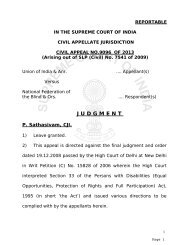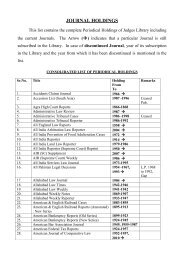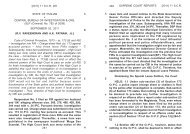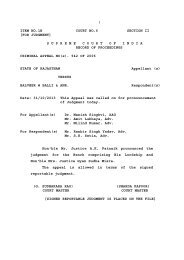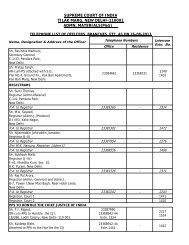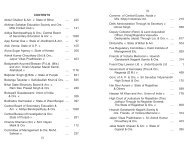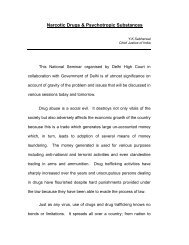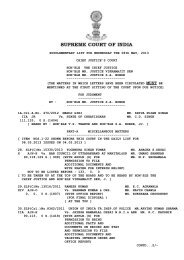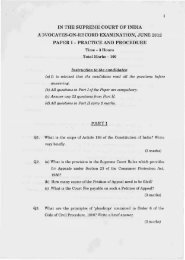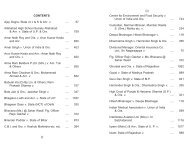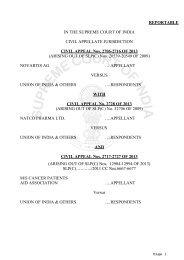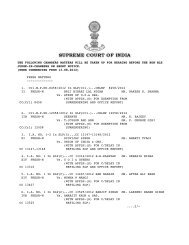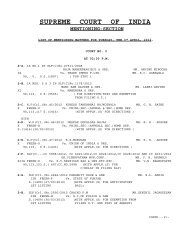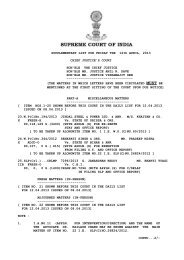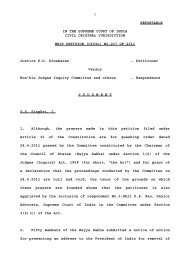Part No.IV - Supreme Court of India
Part No.IV - Supreme Court of India
Part No.IV - Supreme Court of India
You also want an ePaper? Increase the reach of your titles
YUMPU automatically turns print PDFs into web optimized ePapers that Google loves.
MAHADEV GOVIND GHARGE v. SPL. LAO UPPER KRISHNA<br />
PROJECT JAMKHANDI, KARNATAKA<br />
appeal itself was admitted in their presence. Further, the<br />
<strong>Court</strong> directed that the records from lower court be called<br />
and after receipt <strong>of</strong> such record the appeal was directed<br />
to be listed for final disposal. Thus, the cross-objector<br />
not merely had the knowledge <strong>of</strong> pendency <strong>of</strong> the appeal<br />
and order <strong>of</strong> the High <strong>Court</strong> for its final disposal but he<br />
actually participated at all the stages <strong>of</strong> the proceedings<br />
before that <strong>Court</strong>, i.e. at the stage <strong>of</strong> admission <strong>of</strong> appeal,<br />
passing <strong>of</strong> interim orders and variation there<strong>of</strong> and at the<br />
stage <strong>of</strong> consideration <strong>of</strong> application <strong>of</strong> the crossobjector,<br />
moved for early hearing <strong>of</strong> the appeal and, in<br />
fact, the appeal had been directed to be heard finally in<br />
his presence. Thus, in these circumstances, one month<br />
<strong>of</strong> prescribed period in terms <strong>of</strong> Order XLI Rule 22 <strong>of</strong> the<br />
Code shall commence from 12th September, 2001, i.e. the<br />
date on which the High <strong>Court</strong> ordered that the appeal<br />
may be listed for hearing. [Para 58] [871-C-F]<br />
7.6. As the period for filing the cross objection had<br />
long expired, the application for condonation <strong>of</strong> delay was<br />
filed. The appellants in this <strong>Court</strong> themselves admitted<br />
that they had received the notice <strong>of</strong> the appeal through<br />
their counsel and the period <strong>of</strong> one month came to an<br />
end on 12th October, 2001. This submission has been<br />
made in the affidavit annexed to the application filed by<br />
the cross-objector before the High <strong>Court</strong> under Section<br />
5 <strong>of</strong> the Limitation Act, 1963, along with the crossobjections,<br />
praying for condonation <strong>of</strong> delay and leave<br />
<strong>of</strong> that <strong>Court</strong> to file their cross-objections beyond the<br />
statutory period <strong>of</strong> one month as provided in Order XLI<br />
Rule 22 <strong>of</strong> the Code. [Para 59] [871-G-H; 872-A-B]<br />
7.7. Delay was sought to be condoned on the ground<br />
that the appellants have appeared before the <strong>Court</strong> and<br />
despite receipt <strong>of</strong> the notice <strong>of</strong> final hearing they could<br />
not file cross-objections within the prescribed time as<br />
they were out <strong>of</strong> their native place and have gone<br />
843 844<br />
A<br />
B<br />
C<br />
D<br />
E<br />
F<br />
G<br />
H<br />
A<br />
B<br />
C<br />
D<br />
E<br />
F<br />
G<br />
H<br />
SUPREME COURT REPORTS [2011] 8 S.C.R.<br />
elsewhere to earn their livelihood and they could not<br />
therefore receive the letter and that too within one month.<br />
Later, the appellant fell down and his leg was twisted and<br />
because <strong>of</strong> swelling and pain he was not able to drive and<br />
consult his counsel. It is only after he got well, he met his<br />
counsel and filed the cross-objections on 19th<br />
<strong>No</strong>vember, 2002, i.e. after a delay <strong>of</strong> 404 days. The High<br />
<strong>Court</strong> did not find any merit in the reasons shown for<br />
condonation <strong>of</strong> delay and dismissed the said application.<br />
Order XLI Rule 22 <strong>of</strong> the Code itself provides a discretion<br />
to the Appellate <strong>Court</strong> to grant further time to the crossobjector<br />
for the purposes <strong>of</strong> filing cross-objections<br />
provided the cross-objector shows sufficient or<br />
reasonable cause for his inability to file the crossobjections<br />
within the stipulated period <strong>of</strong> one month<br />
from the date <strong>of</strong> receipt <strong>of</strong> the notice <strong>of</strong> hearing <strong>of</strong> appeal.<br />
<strong>No</strong> specific reasons have been recorded by the High<br />
<strong>Court</strong> in the impugned judgment as to why the said<br />
averments did not find favour and was disbelieved. There<br />
is nothing on record to rebut these averments made by<br />
the cross-objector. [Para 60] [872-C-F]<br />
7.8. In the peculiar facts and circumstances <strong>of</strong> this<br />
case, to do complete justice between the parties, the<br />
landowner’s appeal is allowed by setting aside the order<br />
<strong>of</strong> the High <strong>Court</strong>, limited to the extent that the appellants<br />
have been able to show sufficient/reasonable cause for<br />
grant <strong>of</strong> further time to file the cross objections beyond<br />
the period <strong>of</strong> one month in terms <strong>of</strong> Order XLI Rule 22 <strong>of</strong><br />
the Code. This approach could even be adopted without<br />
the aid <strong>of</strong> Section 5 <strong>of</strong> the Limitation Act, 1963, which<br />
provisions may also find application to such matters. The<br />
appellants were entitled to file cross-objections by grant<br />
<strong>of</strong> further time before the High <strong>Court</strong>. Delay in filing the<br />
cross-objections is thus condoned. The High <strong>Court</strong> has<br />
therefore to hear afresh the appeal <strong>of</strong> the State as also<br />
the cross objections <strong>of</strong> the landowners. In that view <strong>of</strong>



